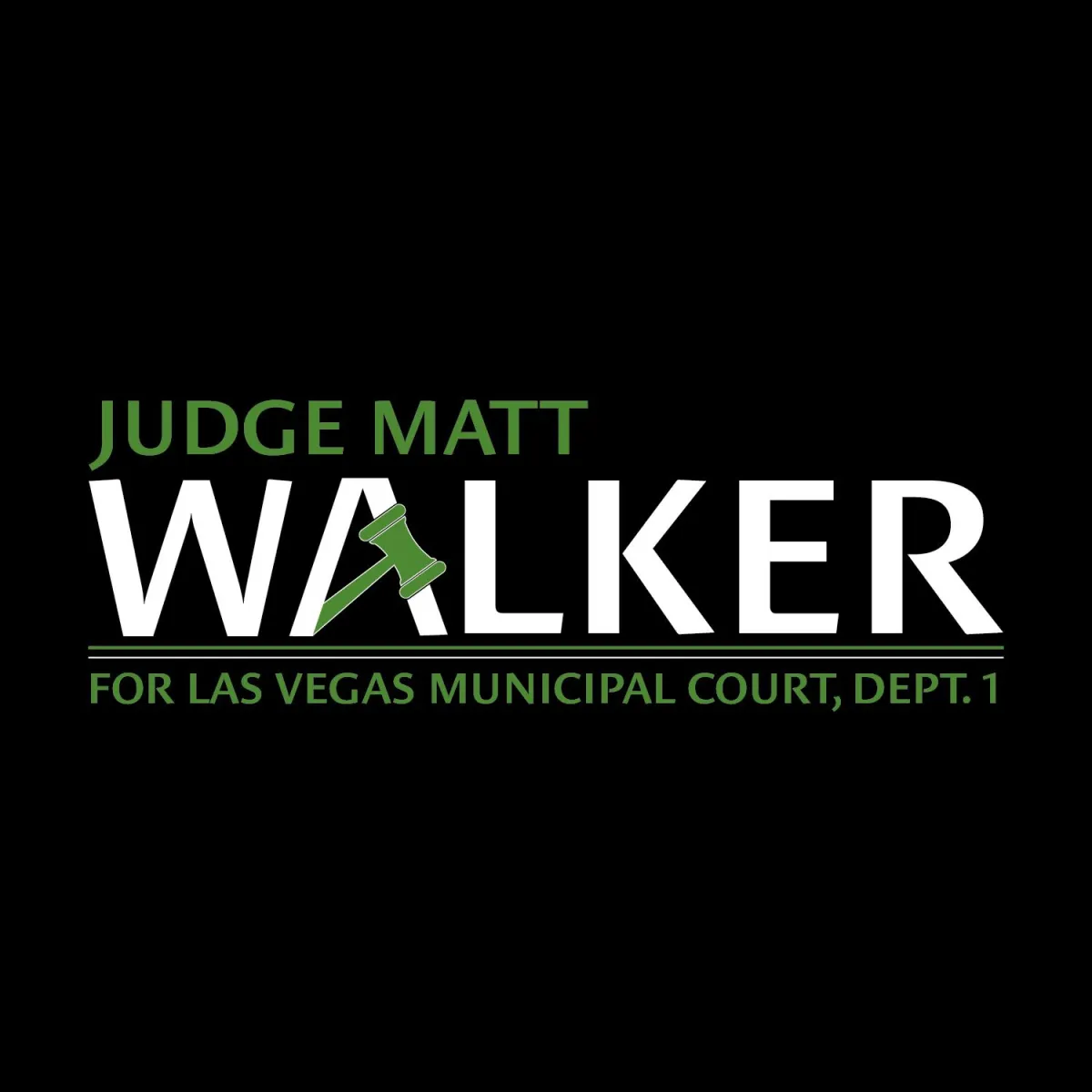
Judge Matt Walker
Justice with Heart: How Judge Matt Walker is Redefining Accountability in Las Vegas
In a courtroom that sees more than a hundred cases a day, one judge is proving that compassion and accountability can coexist and change lives in the process.
The gavel comes down lightly, more a gesture of acknowledgment than punishment. In the Las Vegas Municipal Court, where hundreds of cases pass through daily, Judge Matt Walker begins another session of the Veterans Treatment Program. The air carries a quiet tension, but also something rare for a courtroom: hope.
For Walker, each face before him is more than a case number. “A lot of the people who come in front of me, this is their first touch with law enforcement,” he explains. “My question is always, how do we keep this person from coming back? How do we keep them from ending up in a more serious court with more serious consequences?”
That question, simple yet profound, guides much of his work today not only as a judge overseeing high-volume misdemeanor cases, but also as a mentor, advocate, and architect of second chances.
From Prosecutor to Public Servant
Walker’s journey to the bench began more than seventeen years ago inside the same courtrooms where he now presides. Before donning the robe, he served as a prosecutor in the Las Vegas City Attorney’s Office, managing a broad range of cases from traffic violations to appeals before the Nevada Supreme Court.
That experience gave him more than legal expertise. It gave him insight into how the system could do better, how it could serve not just the law, but the people behind each file.
“When our Chief Judge, Cynthia Leong, retired earlier this year, I saw an opportunity to bring that perspective to the bench,” he says. After a competitive appointment process, the Las Vegas City Council selected Walker to fill the vacancy. “It was an honor, and also a responsibility. I knew I wanted to make an impact that went beyond just decisions on paper.”
Stepping into the role was both familiar and foreign. As a prosecutor, his job had been to advocate for the city’s interests and victims. As a judge, his duty is to everyone: victims, defendants, and the broader community.
“The biggest challenge was making that shift from being an advocate to being impartial,” he reflects. “As a judge, I hear both sides, review the evidence, and decide based only on what’s presented in court. It’s a different mindset. But it’s also incredibly rewarding, because you see justice happen in real time.”
A Courtroom Built on Compassion
Despite handling over a hundred cases daily, Walker insists that volume should never come at the expense of humanity.
“Even though we’re a high-volume court, municipal court is unique because we have the chance to intervene early,” he explains. “We can help people change course before they go on to commit more serious crimes.”
This philosophy of early intervention takes tangible form in the Veterans Treatment Court, one of six specialty courts within Las Vegas Municipal Court. Designed for defendants with a history of military service and challenges such as substance use or mental health struggles, the program blends accountability with rehabilitation.
It runs for twelve to eighteen months, a stretch of time in which participants receive treatment, counseling, job support, and housing assistance. “Our goal is stability,” Walker says. “We want participants to leave with the tools they need to handle life’s challenges on their own, so they don’t end up back here.”
Graduation days from the program are often emotional. Walker smiles as he recalls a recent one. “One of our graduates read a poem about his time in the service and how he’d lost his way after coming home. By the end, there wasn’t a dry eye in the room,” he says. “Moments like that remind you why this work matters.”
Balancing Justice and Humanity
While many imagine courtrooms as cold or adversarial spaces, Walker has a different approach. He strives to create an environment that balances structure with understanding, one where accountability comes hand in hand with opportunity.
“Justice isn’t just about punishment,” he says firmly. “It’s about helping people rebuild when they’re ready to do the work. We can’t make anyone change, but we can give them the tools and the accountability they need to do it.”
It’s a philosophy that resonates with both sides of the aisle. Since taking the bench, Walker has earned respect from city attorneys, defense lawyers, and staff alike. “My team is incredible,” he says. “They’re not shy about giving feedback or suggesting better ways to do things. Having that kind of collaboration makes all the difference.”
His courtroom, though busy, reflects this tone. It is structured yet humane, orderly yet approachable. Walker’s calm demeanor helps create a sense of dignity in a space where people often expect only judgment.
Expanding the Mission
The Veterans Treatment Court is only one part of Walker’s broader vision for community justice. He believes that when courts act as partners rather than punishers, entire communities benefit.
Currently, he and his team are working to expand their mentorship component, adding peer support for participants who have faced similar struggles and can offer empathy from lived experience.
“Having someone who’s been there, who’s faced addiction or mental health challenges and come out the other side, that can make all the difference,” Walker explains. “Sometimes people need a fellow veteran to talk to, not just a judge or counselor.”
The expansion comes at a time when Las Vegas, like many cities, faces financial constraints. Yet Walker remains optimistic, finding creative solutions to stretch resources and strengthen partnerships.
“We’re working with community organizations and the Armed Forces Chamber to host events like our upcoming Veterans Resource Fair,” he says, referring to the December 4 event at the Las Vegas Municipal Court. “It’s about connecting veterans with the services they need: housing, employment, healthcare, and even help resolving old court cases.”
That outreach goes beyond his courtroom walls. Through his growing online presence, including his website, www.JudgeMattWalker.com, and Facebook page, Judge Matt Walker shares updates, community events, and moments of transformation from his court.
“People want to see what’s happening in their justice system,” he says. “Transparency builds trust. The more they know about who I am and what I stand for, the more they can see that we’re here to serve them.”
Lessons from the Bench
Walker’s transition from advocate to judge has given him a renewed appreciation for nuance. Every day brings cases that test empathy, discipline, and balance.
“Being the one to make the final decision is very different,” he admits. “As a prosecutor, I could make recommendations. As a judge, I have to live with the decisions I make. That weight makes you deliberate more carefully, and it humbles you.”
Still, it is the human stories, the transformations, the small victories that keep him motivated. “When I see someone complete our treatment program, when I see victims made whole again, that’s the most gratifying part of the job,” he says.
He pauses before adding, “We’re not here to destroy lives. We’re here to restore them.”
A Judge Who Stands Among the People
Perhaps what sets Walker apart most is his philosophy that judges should not be distant figures behind the bench. He wants the community to see their courts as approachable, fair, and genuinely invested in people’s well-being.
“I want people to realize that judges are human,” he says. “We live here, we work here, and we care about the same things everyone else does: safety, fairness, and a thriving community.”
It’s a perspective that guides everything from his outreach efforts to his courtroom tone. Whether he’s addressing a defendant or a victim, his message is consistent: accountability is important, but so is dignity.
And that balance, he believes, is what keeps communities strong.
Looking Ahead
In the next year, Walker hopes to see the Veterans Treatment Court expand both its reach and its mentorship component, while continuing to host more community-centered events like the upcoming resource fair. “We’re already seeing the impact,” he says. “Referrals come in every week from people who need help. The more we can do, the more lives we can change.”
He’s also preparing for the next election cycle, seeking to continue his service on the bench. But regardless of campaigns or titles, his mission remains constant: to use the court system as a tool for growth, redemption, and safety.
For a city as dynamic as Las Vegas, it’s a mission worth rooting for.
A Community’s Court
What Judge Matt Walker is building in Las Vegas is more than a docket of cases. It’s a vision of justice grounded in empathy and accountability, where those who have fallen can find their footing again.
His work reminds residents that the court system is not a place of punishment alone, but of a potential place where second chances can bloom when someone believes they are worth it.
For Walker, that belief is the heart of public service. “We’re all part of this community,” he says. “And if we can help people become stable, contributing members again, everyone benefits.”
To learn more about Judge Walker’s work, visit www.JudgeMattWalker.com or follow Judge Matt Walker on Facebook for updates on community events, Veterans Treatment Court news, and outreach initiatives.
This feature is part of The Business View Journal’s Local Spotlight Series — your trusted source for discovering the best small businesses in your community.


